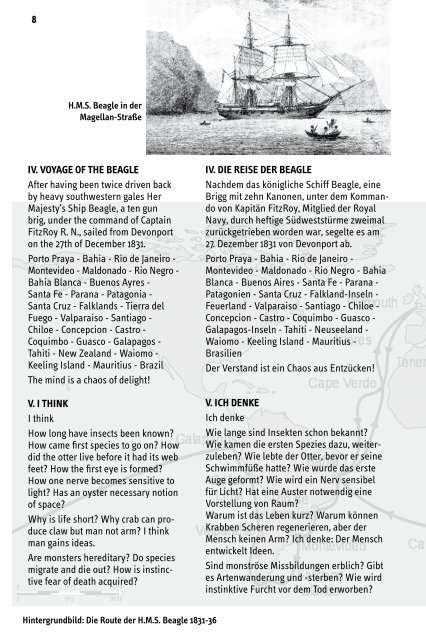Programmheft - Orchester und Projektchor der Universität Bremen
Programmheft - Orchester und Projektchor der Universität Bremen
Programmheft - Orchester und Projektchor der Universität Bremen
Sie wollen auch ein ePaper? Erhöhen Sie die Reichweite Ihrer Titel.
YUMPU macht aus Druck-PDFs automatisch weboptimierte ePaper, die Google liebt.
8 9<br />
H.M.S. Beagle in <strong>der</strong><br />
Magellan-Straße<br />
IV. VOYAgE OF THE BEAgLE<br />
After having been twice driven back<br />
by heavy southwestern gales Her<br />
Majesty‘s Ship Beagle, a ten gun<br />
brig, <strong>und</strong>er the command of Captain<br />
FitzRoy R. N., sailed from Devonport<br />
on the 27th of December 1831.<br />
Porto Praya - Bahia - Rio de Janeiro -<br />
Montevideo - Maldonado - Rio Negro -<br />
Bahia Blanca - Buenos Ayres -<br />
Santa Fe - Parana - Patagonia -<br />
Santa Cruz - Falklands - Tierra del<br />
Fuego - Valparaiso - Santiago -<br />
Chiloe - Concepcion - Castro -<br />
Coquimbo - Guasco - Galapagos -<br />
Tahiti - New Zealand - Waiomo -<br />
Keeling Island - Mauritius - Brazil<br />
The mind is a chaos of delight!<br />
V. I THINK<br />
I think<br />
How long have insects been known?<br />
How came first species to go on? How<br />
did the otter live before it had its web<br />
feet? How the first eye is formed?<br />
How one nerve becomes sensitive to<br />
light? Has an oyster necessary notion<br />
of space?<br />
Why is life short? Why crab can produce<br />
claw but man not arm? I think<br />
man gains ideas.<br />
Are monsters hereditary? Do species<br />
migrate and die out? How is instinctive<br />
fear of death acquired?<br />
Hintergr<strong>und</strong>bild: Die Route <strong>der</strong> H.M.S. Beagle 1831-36<br />
IV. DIE REISE DER BEAgLE<br />
Nachdem das königliche Schiff Beagle, eine<br />
Brigg mit zehn Kanonen, unter dem Kommando<br />
von Kapitän FitzRoy, Mitglied <strong>der</strong> Royal<br />
Navy, durch heftige Südweststürme zweimal<br />
zurückgetrieben worden war, segelte es am<br />
27. Dezember 1831 von Devonport ab.<br />
Porto Praya - Bahia - Rio de Janeiro -<br />
Montevideo - Maldonado - Rio Negro - Bahia<br />
Blanca - Buenos Aires - Santa Fe - Parana -<br />
Patagonien - Santa Cruz - Falkland-Inseln -<br />
Feuerland - Valparaiso - Santiago - Chiloe -<br />
Concepcion - Castro - Coquimbo - Guasco -<br />
Galapagos-Inseln - Tahiti - Neuseeland -<br />
Waiomo - Keeling Island - Mauritius -<br />
Brasilien<br />
Der Verstand ist ein Chaos aus Entzücken!<br />
V. ICH DENKE<br />
Ich denke<br />
Wie lange sind Insekten schon bekannt?<br />
Wie kamen die ersten Spezies dazu, weiterzuleben?<br />
Wie lebte <strong>der</strong> Otter, bevor er seine<br />
Schwimmfüße hatte? Wie wurde das erste<br />
Auge geformt? Wie wird ein Nerv sensibel<br />
für Licht? Hat eine Auster notwendig eine<br />
Vorstellung von Raum?<br />
Warum ist das Leben kurz? Warum können<br />
Krabben Scheren regenerieren, aber <strong>der</strong><br />
Mensch keinen Arm? Ich denke: Der Mensch<br />
entwickelt Ideen.<br />
Sind monströse Missbildungen erblich? Gibt<br />
es Artenwan<strong>der</strong>ung <strong>und</strong> -sterben? Wie wird<br />
instinktive Furcht vor dem Tod erworben?<br />
God is supposed to create and destroy<br />
without rule. But what does he in this<br />
world without rule?<br />
Why there is not perfect gradation of<br />
change? Why not have some intermediate<br />
forms been discovered? Why<br />
2 of ostriches in S. America? Why<br />
are species not formed during ascent<br />
of mountain? Why is thought more<br />
won<strong>der</strong>ful than gravity? Do changes<br />
of habit affect particular organs?<br />
Glimpses bursting on mind, giving<br />
rise to the wildest imagination and<br />
superstition.<br />
VI. HOW DOES IT COME WANDERINg<br />
BIRDS?<br />
How does it come wan<strong>der</strong>ing birds?<br />
Such sandpipers!<br />
Such sandpipers not new in Galapagos.<br />
Did the Creative Force know that<br />
these species could arrive? Did it only<br />
create those species not so likely to<br />
wan<strong>der</strong>? Did it create two species<br />
closely allied to muscicapa coronata<br />
but not coronata?<br />
There never were any constant species.<br />
VII. 200 BEETLES<br />
Two h<strong>und</strong>red beetles deficient in<br />
wings, they cannot fly. Due to the<br />
action mainly of natural selection<br />
mainly but combined probably with<br />
disuse.<br />
Von Gott wird erwartet, dass er ohne<br />
Regeln erschafft <strong>und</strong> zerstört. Aber was<br />
macht er in dieser Welt ohne Regeln?<br />
Warum gibt es keine perfekte Abstufung<br />
<strong>der</strong> Verän<strong>der</strong>ungen? Warum sind keine<br />
Zwischenformen gef<strong>und</strong>en worden?<br />
Warum gibt es in Südamerika zwei Arten<br />
von Straußenvögeln? Warum bilden<br />
sich Arten nicht bei <strong>der</strong> Entstehung<br />
eines Berges? Warum sind Gedanken<br />
so viel w<strong>und</strong>erbarer als Schwerkraft?<br />
Beeinflussen Verän<strong>der</strong>ungen von Gewohnheiten<br />
bestimmte Organe?<br />
Flüchtige Einblicke lo<strong>der</strong>n durch den<br />
Verstand, lassen wildeste Fantasien <strong>und</strong><br />
Aberglauben entstehen.<br />
VI. WIE VERHÄLT ES SICH MIT UMHER-<br />
STREIFENDEN VÖgELN?<br />
Wie verhält es sich mit den umherstreifenden<br />
Vögeln? Solche Flussuferläufer!<br />
Solche Flussuferläufer, die nicht neu auf<br />
Galapagos sind.<br />
Hat die schöpferische Kraft gewusst,<br />
dass diese Spezies ankommen könnten?<br />
Hat sie nur diese Arten entwickelt, die<br />
wahrscheinlich nicht umherstreifen?<br />
Hat sie zwei Arten erschaffen, eng verwandt<br />
zum Fliegenschnäpper, aber eben<br />
nicht <strong>der</strong> Fliegenschnäpper?<br />
Es gab nie unverän<strong>der</strong>liche Arten.<br />
VII. 200 KÄFER<br />
Zweih<strong>und</strong>ert Käfer mit unvollkommenen<br />
Flügeln, sie können nicht fliegen.<br />
Hauptsächlich durch natürliche Selektion,<br />
doch wahrscheinlich in Verbindung<br />
mit Nichtgebrauch.


